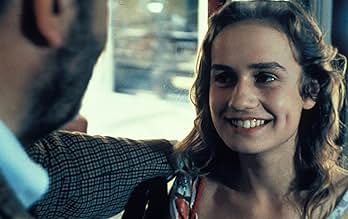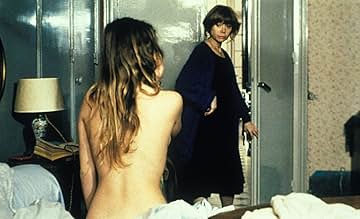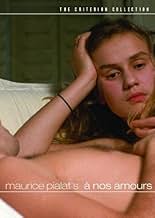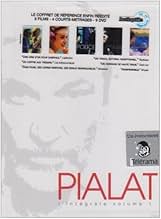VALUTAZIONE IMDb
7,1/10
7558
LA TUA VALUTAZIONE
La famiglia di una giovane donna cerca disperatamente di controllare il suo comportamento sempre più provocante.La famiglia di una giovane donna cerca disperatamente di controllare il suo comportamento sempre più provocante.La famiglia di una giovane donna cerca disperatamente di controllare il suo comportamento sempre più provocante.
- Regia
- Sceneggiatura
- Star
- Premi
- 4 vittorie e 3 candidature totali
Recensioni in evidenza
"The only time I'm happy is when I'm with a guy," says Suzanne, (Sandrine Bonnaire) a promiscuous and directionless teenager. Suzanne's parents are splitting up; her brother beats her as a disciplinary gesture in her father's absence; and her mother has control over nothing. Suzanne hangs out with her friends; sleeps with anyone she is attracted to (except the boy that loves her); and returns home for knock down, drag out fights with her older brother and mother. The last 30 minutes of the film skips quickly into Suzanne's life after marriage and jumps yet again to her life after divorce. The only person Suzanne loves is her father; perhaps because he is the only person who understands and unconditionally loves her. Fine direction from Maurice Pialat who also plays Suzanne's father. Excellent acting from most of the cast saves a somewhat meandering and overwrought script.
For many, the lack of a defined storyline is maddening, often resulting in a less than satisfying experience. Almost stream-of-consciousness in its approach, Maurice Pialat's À Nos Amours does not appear to have much story structure, but the story is most definitely there and is related with a subtlety not often found in modern film.
Bonnaire's portrayal of Susanne is brilliant (as others have said), and her almost wistful sadness permeates the performance. In one scene, her father (played by Pialat) says, "You never smile anymore," indicating the transformation of Susanne from innocence to experience. The men in her life are shown only for the time she is with them. There is neither introduction upon their arrival nor explanation as to their departure. Pialat uses this method to show Susanne's lack of emotional investment in these temporary romances.
The only men who do return are her father, her brother, and Luc, her one real love. It is when she is with these men that she shows her true self, rather than the detached uncaring girl who sleeps around in an effort to replace them. The dialogue drives this film. There is little music, save the inspired use of Klaus Nomi's "The Cold Song". The sad wailing of Nomi's pseudo-operatic vocal against the opening credits of Susanne in the pulpit of a boat is a wonderful moment.
Long out of print, this film is now available on DVD. It is deserving of a look by the discerning cinephile who may have missed it 25 years ago.
Bonnaire's portrayal of Susanne is brilliant (as others have said), and her almost wistful sadness permeates the performance. In one scene, her father (played by Pialat) says, "You never smile anymore," indicating the transformation of Susanne from innocence to experience. The men in her life are shown only for the time she is with them. There is neither introduction upon their arrival nor explanation as to their departure. Pialat uses this method to show Susanne's lack of emotional investment in these temporary romances.
The only men who do return are her father, her brother, and Luc, her one real love. It is when she is with these men that she shows her true self, rather than the detached uncaring girl who sleeps around in an effort to replace them. The dialogue drives this film. There is little music, save the inspired use of Klaus Nomi's "The Cold Song". The sad wailing of Nomi's pseudo-operatic vocal against the opening credits of Susanne in the pulpit of a boat is a wonderful moment.
Long out of print, this film is now available on DVD. It is deserving of a look by the discerning cinephile who may have missed it 25 years ago.
This is the story of a teenage French girl (Sandrine Bonnaire) with a difficult home life. Both her father (who abandons the family) and her older brother (who regularly physically assaults her) seem to have an unnatural interest in her sexuality, while her mother (who may the worst of them all) is a raving hysteric who eggs everyone else on. Not surprisingly, the girl is quite promiscuous, availing herself of any number of boys and men. In an American movie like this, her male paramours would at best be panting dogs and at worst villainous cads taking advantage of a vulnerable girl, but here they're probably the most sympathetic people in the movie!
The young girl is not unsympathetic by any means, but she simply refuses to be a victim and remains firmly in control, and no family member or lover ultimately seems to have much chance against her. She is similar to the kind of "feminist lolitas" that often appear in Catherine Breillat movies like "A Real Young Girl" and "36 Fillete"-- teen girls that are very desirable, but also wise beyond their years and in perfect control of their own sexuality, and thus never simply mere sex objects. It's surprising Bonnaire never worked directly with Breillat because she is a much more self-assured and commanding actress than any of the ones Breillat did work with. I don't know if I believe the IMDb dates regarding Bonnaire's age as her assured acting (and her nude body) suggest that she was somewhat older than the character she's playing here, but she's very impressive regardless. Interestingly, while she became a very formidable actress in her later years (especially in films like Claude Chabrol's "Initiation"), she would not really be one of your more glamorous and sexy French actress. She certainly compares well to her contemporaries at the time like Emmanuelle Beart and Sophie Marceau, but while they would become leading ladies, she stayed more of a character actress.
Ironically, the one problem I had with the movie is that Bonnaire and her character is perhaps TOO self-assured and as an actress Bonnaire tends to dominate the rest of the cast too much. It might be a feminist statement to have young female protagonist who is this self-confident, but I don't know that it's necessarily very realistic.
The young girl is not unsympathetic by any means, but she simply refuses to be a victim and remains firmly in control, and no family member or lover ultimately seems to have much chance against her. She is similar to the kind of "feminist lolitas" that often appear in Catherine Breillat movies like "A Real Young Girl" and "36 Fillete"-- teen girls that are very desirable, but also wise beyond their years and in perfect control of their own sexuality, and thus never simply mere sex objects. It's surprising Bonnaire never worked directly with Breillat because she is a much more self-assured and commanding actress than any of the ones Breillat did work with. I don't know if I believe the IMDb dates regarding Bonnaire's age as her assured acting (and her nude body) suggest that she was somewhat older than the character she's playing here, but she's very impressive regardless. Interestingly, while she became a very formidable actress in her later years (especially in films like Claude Chabrol's "Initiation"), she would not really be one of your more glamorous and sexy French actress. She certainly compares well to her contemporaries at the time like Emmanuelle Beart and Sophie Marceau, but while they would become leading ladies, she stayed more of a character actress.
Ironically, the one problem I had with the movie is that Bonnaire and her character is perhaps TOO self-assured and as an actress Bonnaire tends to dominate the rest of the cast too much. It might be a feminist statement to have young female protagonist who is this self-confident, but I don't know that it's necessarily very realistic.
Others have already said that "À nos amours" is a great film, even more have said that Sandrine Bonnaire was a knockout in her demanding rôle as Suzanne. There is a sort of timeline, a beginning and an end, but this is really a film about a personal journey through a part of Suzanne's late adolescence. Young people who have watched the film recently are sometimes very annoyed with Suzanne, but this only proves that Miss Bonnaire has made them care about her character even to the point that they perhaps want to shake her, to take her into a corner and tell her what mistakes she is making. There is also a conflict which some pretend had disappeared by the end of the "swinging sixties" - the generation gap between the sexual mores of parents and adolescents, which was of course still real in the early eighties and remains so in many cultures. Unpredictable behaviour (by Suzanne's brother, for example) is also a real part of family life for many young people. Every time I watch the film (and I have seen it very often, as I used it in my French classes more than once) I notice details which had escaped me or which I had forgotten. Pialat made other great films, but "À nos amours" remains my favourite. If possible watch it in French, with subtitles if necessary - but see it before you die!
15-year old Suzanne (Sandrine Bonnaire) is a precocious child, living with her mother, her career-driven brother, and her sometimes overbearing father (played by Maurice Pialat). She has recently split from her boyfriend and is intent on moving from man to man in search of sexual pleasures and guardianship. When her father splits from her mother and moves out, home life becomes unbearable as her mother and brother disapprove of her lifestyle. She is most comfortable in the arms of a man, be it one of her seducers or her father. Men seems to flock to her, as she is pretty, charming and is happy to accommodate her admirers.
This is the second film that I've seen directed by French master Maurice Pialat, the other being the excellent L'Enfance Nue. They are both similar films in terms of themes and execution, and tell the familiar coming-of-age story from an original perspective. Whereas the former was a sledgehammer portrayal of a young juvenile causing havoc amongst the various foster homes he was placed, where redemption never seems possible, A Nos Amours' Suzanne is a more sympathetic lead character, and her journey is portrayed in a more subtle manner. While it would be shocking to hear of a 15 year old girl bedding a number of men, Pialat is more focused on what drives her to act this way.
She is not a tease, and she doesn't flaunt her body to anyone who will look. Instead, she seems to simply enjoy the comfort of a man. When the father moves away, her home life falls apart and her bed-mates increase. Perhaps Pialat is trying to portray the impact an absent father can have on a child, or that all women need comforting every once in a while. Or maybe this is an individual character study, with no overriding message. What it most definitely is, though, is a wonderfully acted (especially from the young Bonnaire), intelligent, and intriguing film that has Pialat's usual cold detachment alongside a certain intimacy with the lead character.
www.the-wrath-of-blog.blogspot.com
This is the second film that I've seen directed by French master Maurice Pialat, the other being the excellent L'Enfance Nue. They are both similar films in terms of themes and execution, and tell the familiar coming-of-age story from an original perspective. Whereas the former was a sledgehammer portrayal of a young juvenile causing havoc amongst the various foster homes he was placed, where redemption never seems possible, A Nos Amours' Suzanne is a more sympathetic lead character, and her journey is portrayed in a more subtle manner. While it would be shocking to hear of a 15 year old girl bedding a number of men, Pialat is more focused on what drives her to act this way.
She is not a tease, and she doesn't flaunt her body to anyone who will look. Instead, she seems to simply enjoy the comfort of a man. When the father moves away, her home life falls apart and her bed-mates increase. Perhaps Pialat is trying to portray the impact an absent father can have on a child, or that all women need comforting every once in a while. Or maybe this is an individual character study, with no overriding message. What it most definitely is, though, is a wonderfully acted (especially from the young Bonnaire), intelligent, and intriguing film that has Pialat's usual cold detachment alongside a certain intimacy with the lead character.
www.the-wrath-of-blog.blogspot.com
Lo sapevi?
- QuizIn the original script, the father was due to die and was not scheduled to return at the time of the dinner scene. Maurice Pialat walked into the scene and left the actors to improvise in a situation they hadn't planned for.
- BlooperIn the sequence with the American, Suzanne's outfit changes from a one-shoulder black dress with white stripes trimming just the top of the bodice, to a one-shoulder black&white striped top with a black skirt, and back again.
- ConnessioniFeatured in Sebastian (2024)
I più visti
Accedi per valutare e creare un elenco di titoli salvati per ottenere consigli personalizzati
- How long is To Our Loves?Powered by Alexa
Dettagli
- Data di uscita
- Paese di origine
- Siti ufficiali
- Lingue
- Celebre anche come
- To Our Loves
- Luoghi delle riprese
- Cité Bergère, Paris 9, Parigi, Francia(Suzanne and Jean-Pierre looking for a hotel)
- Aziende produttrici
- Vedi altri crediti dell’azienda su IMDbPro
Botteghino
- Lordo in tutto il mondo
- 2575 USD
Contribuisci a questa pagina
Suggerisci una modifica o aggiungi i contenuti mancanti



















